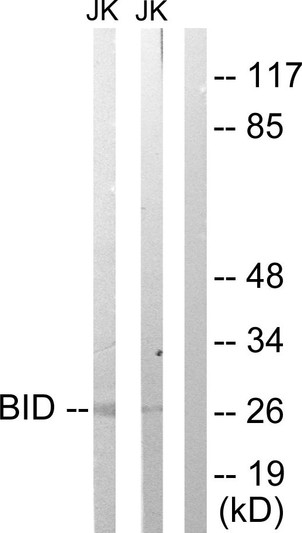| Post Translational Modifications | BH3-interacting domain death agonist: TNF-alpha induces caspase-mediated cleavage into a major p15 and minor p13 and p11 products. Cleaved by CASP6 into a major p15 and minor p13 products, leading to release of cytochrome c and subsequent nonalcoholic steatohepatitis. BH3-interacting domain death agonist p15: Ubiquitinated by ITCH.ubiquitination results in proteasome-dependent degradation. |
| Function | Induces caspases and apoptosis. Counters the protective effect of BCL2. BH3-interacting domain death agonist p15: Induces caspase activation and apoptosis. Allows the release of cytochrome c. Isoform 1: Induces ICE-like proteases and apoptosis. Isoform 2: Induces ICE-like proteases and apoptosis. Isoform 3: Does not induce apoptosis. Isoform 4: Induces ICE-like proteases and apoptosis. |
| Protein Name | Bh3-Interacting Domain Death AgonistP22 BidBid Cleaved Into - Bh3-Interacting Domain Death Agonist P15P15 Bid - Bh3-Interacting Domain Death Agonist P13P13 Bid - Bh3-Interacting Domain Death Agonist P11P11 Bid |
| Database Links | Reactome: R-HSA-111447Reactome: R-HSA-111452Reactome: R-HSA-111453Reactome: R-HSA-114294Reactome: R-HSA-6803204Reactome: R-HSA-75108 |
| Cellular Localisation | CytoplasmMitochondrion MembraneMitochondrion Outer MembraneWhen UncleavedIt Is Predominantly CytoplasmicBh3-Interacting Domain Death Agonist P15: Mitochondrion MembraneTranslocates To Mitochondria As An Integral Membrane ProteinBh3-Interacting Domain Death Agonist P13: Mitochondrion MembraneAssociated With The Mitochondrial MembraneIsoform 1: CytoplasmIsoform 3: CytoplasmIsoform 2: Mitochondrion MembraneA Significant Proportion Of Isoform 2 Localizes To MitochondriaIt May Be Cleaved Constitutively |
| Alternative Antibody Names | Anti-Bh3-Interacting Domain Death Agonist antibodyAnti-P22 Bid antibodyAnti-Bid Cleaved Into - Bh3-Interacting Domain Death Agonist P15 antibodyAnti-P15 Bid - Bh3-Interacting Domain Death Agonist P13 antibodyAnti-P13 Bid - Bh3-Interacting Domain Death Agonist P11 antibodyAnti-P11 Bid antibodyAnti-BID antibody |
Information sourced from Uniprot.org












